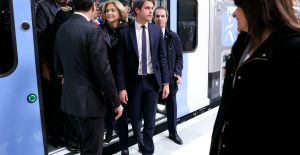Since April 2022, young Lisbon residents, as well as those over 65, have enjoyed unlimited access to buses, metros and those famous yellow trams. “Along with Tallinn in Estonia, we are the only European capital and one of the few cities in southern Europe to have made public transport free. The results are beyond our expectations: just over 90,000 people use the new subscription, compared to 70,000 at the start of the year, or already more than one citizen in eight, and we have seen a sharp increase since the start of the school year. We hope that our example will inspire other cities,” explains Carlos Moedas, the mayor of Lisbon.
If the primary objective of the measure is to reduce emissions in this city which is aiming for carbon neutrality by 2030, its most marked benefit is not environmental, but social. “Among the new users, there are many seniors for whom taking the bus or the metro helps to break their loneliness,” explains the councilor.
In 2013, the Estonian capital was the first city in the world to make its transport free. Seven years later, Luxembourg was the first country to allow its residents and tourists to board without tickets. In October 2022, it was the island of Malta’s turn to offer its residents the opportunity to travel by bus without spending a cent. Without going so far as to make it free for all or a majority of the population, many regions and cities in the United States as well as in Europe, but also in China, have made public transport prices more attractive in recent years.
From Geneva and Basel, where public transport is free for tourists, to Austria where the Klimaticket allows travel for 3 euros per day, to the famous German flat rate of 49 euros per month. Let us also cite Spain, which has decided to extend, due to its success, until the end of 2023 the free use of its regional railways, decided in September 2022 to promote public transport, but above all to increase purchasing power .
“Free public transport has been debated for decades. The main argument in its favor is to promote mobility for the less well-off who are forced to live in the suburbs,” explains Oded Cats, transport specialist at the University of Delft, who recommends, like the IPCC, specific measures for disadvantaged populations. In a study on Tallinn, this researcher demonstrates that free access for all can have perverse effects and even be harmful to the environment. Thus, in the Estonian capital, the population has abandoned soft mobility. This is why the Netherlands, where students have traveled free of charge for more than thirty years, is not considering extending this system, believing that “previous experiences have not made it possible to reduce road traffic”.
To convince motorists, it is better to raise parking or fuel prices, believes Oded Cats, stressing that “the choice of mode of transport also depends on subjective factors”. To promote public transport in order to reduce emissions from the most polluting sector, confidence in buses and metros, through their punctuality and frequency but above all their image, is even more important than their price.
Society, health, environment, education, energy

 What is chloropicrin, the chemical agent that Washington accuses Moscow of using in Ukraine?
What is chloropicrin, the chemical agent that Washington accuses Moscow of using in Ukraine? Poland, big winner of European enlargement
Poland, big winner of European enlargement In Israel, step-by-step negotiations for a ceasefire in the Gaza Strip
In Israel, step-by-step negotiations for a ceasefire in the Gaza Strip BBVA ADRs fall almost 2% on Wall Street
BBVA ADRs fall almost 2% on Wall Street Children born thanks to PMA do not have more cancers than others
Children born thanks to PMA do not have more cancers than others Breast cancer: less than one in two French women follow screening recommendations
Breast cancer: less than one in two French women follow screening recommendations “Dazzling” symptoms, 5,000 deaths per year, non-existent vaccine... What is Lassa fever, a case of which has been identified in Île-de-France?
“Dazzling” symptoms, 5,000 deaths per year, non-existent vaccine... What is Lassa fever, a case of which has been identified in Île-de-France? Sánchez cancels his agenda and considers resigning: "I need to stop and reflect"
Sánchez cancels his agenda and considers resigning: "I need to stop and reflect" “Amazon product tester”: the gendarmerie warns of this new kind of scam
“Amazon product tester”: the gendarmerie warns of this new kind of scam “Unjustified allegations”, “promotion of illicit products”… Half of the influencers controlled in 2023 caught by fraud repression
“Unjustified allegations”, “promotion of illicit products”… Half of the influencers controlled in 2023 caught by fraud repression Extension of the RER E: Gabriel Attal welcomes a “popular” ecology project
Extension of the RER E: Gabriel Attal welcomes a “popular” ecology project WeWork will close 8 of its 20 shared offices in France
WeWork will close 8 of its 20 shared offices in France “We were robbed of this dignity”: Paul Auster’s wife denounces the betrayal of a family friend
“We were robbed of this dignity”: Paul Auster’s wife denounces the betrayal of a family friend A masterclass for parents to fill in their gaps before Taylor Swift concerts
A masterclass for parents to fill in their gaps before Taylor Swift concerts Jean Reno publishes his first novel Emma on May 16
Jean Reno publishes his first novel Emma on May 16 Cannes Film Festival: Meryl Streep awarded an honorary Palme d’Or
Cannes Film Festival: Meryl Streep awarded an honorary Palme d’Or Omoda 7, another Chinese car that could be manufactured in Spain
Omoda 7, another Chinese car that could be manufactured in Spain BYD chooses CA Auto Bank as financial partner in Spain
BYD chooses CA Auto Bank as financial partner in Spain Tesla and Baidu sign key agreement to boost development of autonomous driving
Tesla and Baidu sign key agreement to boost development of autonomous driving Skoda Kodiaq 2024: a 'beast' plug-in hybrid SUV
Skoda Kodiaq 2024: a 'beast' plug-in hybrid SUV The home mortgage firm rises 3.8% in February and the average interest moderates to 3.33%
The home mortgage firm rises 3.8% in February and the average interest moderates to 3.33% This is how housing prices have changed in Spain in the last decade
This is how housing prices have changed in Spain in the last decade The home mortgage firm drops 10% in January and interest soars to 3.46%
The home mortgage firm drops 10% in January and interest soars to 3.46% The jewel of the Rocío de Nagüeles urbanization: a dream villa in Marbella
The jewel of the Rocío de Nagüeles urbanization: a dream villa in Marbella Europeans: a senior official on the National Rally list
Europeans: a senior official on the National Rally list Blockade of Sciences Po: the right denounces a “drift”, the government charges the rebels
Blockade of Sciences Po: the right denounces a “drift”, the government charges the rebels Even on a mission for NATO, the Charles-de-Gaulle remains under French control, Lecornu responds to Mélenchon
Even on a mission for NATO, the Charles-de-Gaulle remains under French control, Lecornu responds to Mélenchon “Deadly Europe”, “economic decline”, immigration… What to remember from Emmanuel Macron’s speech at the Sorbonne
“Deadly Europe”, “economic decline”, immigration… What to remember from Emmanuel Macron’s speech at the Sorbonne These French cities that will boycott the World Cup in Qatar
These French cities that will boycott the World Cup in Qatar Champions Cup: Toulouse with Flament and Kinghorn against Harlequins, Ramos replacing
Champions Cup: Toulouse with Flament and Kinghorn against Harlequins, Ramos replacing Tennis: still injured in the arm, Alcaraz withdraws from the Masters 1000 in Rome
Tennis: still injured in the arm, Alcaraz withdraws from the Masters 1000 in Rome Sailing: “Like a house that threatens to collapse”, Clarisse Crémer exhausted and in tears aboard her damaged boat
Sailing: “Like a house that threatens to collapse”, Clarisse Crémer exhausted and in tears aboard her damaged boat NBA: Patrick Beverley loses his temper and throws balls at Pacers fans
NBA: Patrick Beverley loses his temper and throws balls at Pacers fans


















